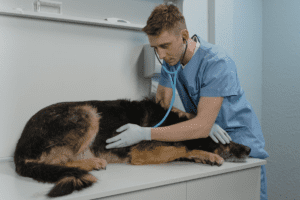Claims against veterinary practitioners for negligence or malpractice are becoming increasingly more common in Australian society, as pets are considered part of the family, and emotions run high when they become ill or die.
A common theme driving complaints about veterinary practitioners is where the vet practitioner has not properly explained all risks and benefits of a particular course of treatment for a pet, including the financial costs of the procedures, or they have not performed to the standard expected of them leading to increased illness or death of the pet.
Your first step
If you believe you have a claim against a veterinary practitioner, you will need to lodge a claim with the Veterinary Practitioners Board for their review. The complaint form and more information about the Board’s processes can be found here. Please be aware that the investigation process could take months to complete and that studies have shown that approximately 72% of cases are dismissed by the Board.
However, you may want to make a claim against a veterinary practitioner if you believe that have engaged in unprofessional conduct. In your pet’s circumstances this may include any conduct performed by the vet of a lesser standard than what the public or another vet practitioner may reasonably expect, or providing services that are excessive, unnecessary, or not required for the well-being of your pet.

Preliminary Investigation
All states have their own Board dealing with complaints against vet practitioners, however in Victoria, the Veterinary Practice Act 1997 gives the Veterinary Practitioners Registration Board of Victoria the power to investigate complaints about the professional conduct of veterinary practitioners registered in Victoria, where they have the option to dismiss the complaint or make orders against the practitioner.
Firstly, the Board will determine whether there should be a preliminary investigation of the complaint. These are conducted to determine whether an informal or formal hearing is required. Throughout this investigation, information such as written statements, photographs, documentation, clinical records and test results will be collected from the complainant, any witnesses and the vet practitioner.
Following the preliminary investigation, the Board may decide that the matter should not proceed further as there has been no unprofessional conduct by the vet practitioner, or the Board may decide to hold a formal or informal hearing with the parties involved to decide if there has been unprofessional conduct on the part of the veterinary practitioner. On some occasions, the Board may conduct a separate investigation into the physical or mental health of the veterinary practitioner where they find cause to believe there may be a problem.

Formal or informal hearing
An informal hearing will be heard before a panel of three board members, two of whom must be veterinary practitioners. The veterinary practitioner who is the subject of the complaint is entitled to attend, however it is closed to the public. The complainant and any witnesses must submit any information to the panel before it begins. If the panel determines that the veterinary practitioner has engaged in unprofessional conduct which is not of a serious nature, the practitioner may be cautioned, reprimanded, or ordered that they undertake counselling or further education.
If unprofessional conduct of a serious nature has been found, the informal panel will refer the matter to a formal hearing. A formal hearing will be heard by not less than three board members which must consist of a lawyer and an independent veterinary practitioner. The veterinary practitioner is entitled to attend the formal hearing with a legal representative and can make submissions to the panel. The complainant and other witnesses may also be required to attend the formal hearing to give evidence. If serious unprofessional conduct is found the panel may determine that the veterinary practitioner be cautioned or reprimanded, required to undertake counselling or further education, have conditions, limitations or restrictions imposed on their registration, be fined a maximum of $2,000, pay the reasonable costs of the hearing, give a written undertaking, have their endorsement as a specialist altered or cancelled, or be suspended or have their registration to practice cancelled.
Next steps
Following the decision of the Board, a person may apply to the Victorian Civil and Administrative Tribunal for review of a finding or determination made by the veterinary board at a formal hearing if they are not satisfied with the outcome of the investigation. You should seek legal advice before pursuing a claim against a veterinary practitioner and the success of such a claim is likely to hinge on expert evidence as well as the findings of the board at the inquiry. Often a pet owner and their vet practitioner are aware that they may be facing a claim due to something having gone wrong in surgery or the like. In such cases, most diligent vets will report the matter to their professional indemnity insurer, who will then appoint a lawyer to represent the vet. Where a pet owner has a lawyer and where there are grounds for a claim against a practitioner, the normal outcome is that the insurer will make a settlement offer to resolve the matter in order to avoid the costs and risks of a trial.
If a finding of unprofessional conduct has been made by the Board, the vet practitioner will usually be defended by the lawyer acting for the vet’s professional indemnity insurer. It is recommended to seek legal advice early as your lawyer will be able to advise you whether you should be lodging a complaint with the veterinary practitioners board, and once you do so they will be able to determine whether you have grounds to pursue a claim for compensation against your veterinary practitioner.
Nicola Maltman – Law Clerk – Matthies Lawyers
Should you have any queries in regard to veterinary negligence matters, please contact Matthies Lawyers for an obligation free consultation or call +61 3 8692 2517 today.
Disclaimer: This article contains general information only and is not intended to be a substitute for obtaining legal advice.
